Comfort women: South Korea's survivors of Japanese brothels
- Published
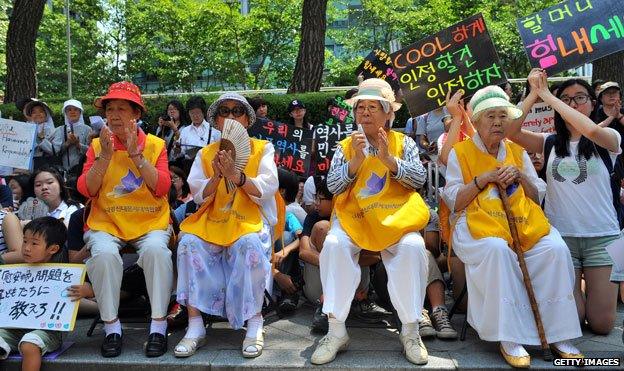
Former "comfort women" at a regular protest outside the Japanese Embassy
Elderly women once forced to work in Japan's military brothels live out their days in a unusual retirement home next to a museum that records their suffering. Their numbers dwindling, the former "comfort women" feel they have never had a full and sincere apology - and are still waiting.
On a winding country road, shadowed by South Korea's mountainous countryside, sits a strange building, jutting awkwardly from the cottages and tomato farms around it.
A sweeping arched portico looks down sternly on the narrow lane, from where you can glimpse the striking statues and memorials inside. There's a gravel car park, bigger than the building's nine elderly residents would normally warrant, and leaflets at the door in English, Japanese and Korean.
Because, despite the game show blaring from the living room television, this isn't your typical retirement home. It's a living museum, known as the House of Sharing, and its statues and plaques tell the story of its residents' unusual lives - as "comfort women" for Japan's wartime army.
Lucy Williamson reports from Seoul on the plight of former "comfort women" forced to work as sex slaves in Japan's military brothels
The youngest resident is now 84, but as young women during World War II, all say they were forced to work as sex slaves in Japan's military brothels.
Yi Ok-seon is a frail old lady with a walking frame who has difficulty speaking. But her eyes, when you meet them, are still sharp.
She says she was 15 when a Korean and a Japanese man forcibly took her to north-west China, then under Japanese control. She had been begging her parents to send her to school for years, but with a dozen children to feed, they couldn't afford it. At the time she was taken, Ok-seon was working away from the family home.
Once in China, she says she was forced into sexual slavery for three years, in "comfort stations" set up by the Japanese military to service its troops.
"I felt really violated, being tricked and taken like that as a young teenager," she says. "It was like a slaughter house there - not for animals, but for humans. Outrageous things were done."
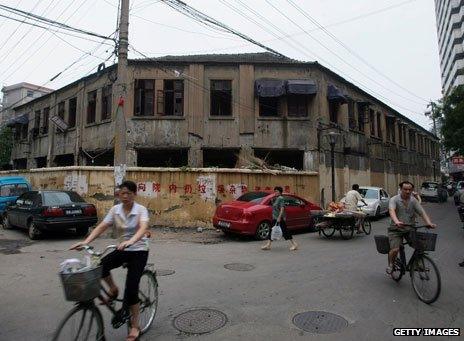
A "military comfort women station" in Nanjing, China
She shows me old scars on her arms and legs - from being stabbed, she says. A volunteer at the house tells me later that she sustained other injuries from that time, preventing her from bearing her own children.
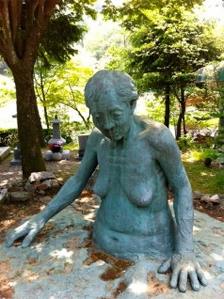
The statue in the museum's garden
Up to 200,000 women are estimated to have worked as comfort women in Japan's military brothels, most of them Korean. Until the end of WWII, Korea was under Japanese occupation, and its people forced to learn Japanese, which meant Korean women were easier to corral - and communicate with - than women of other Asian nationalities.
Many died during their ordeal, and many others died later. Since the issue came into the light in 1981, 234 former comfort women have come forward in Korea. There are now just 59 known survivors - nine live together in the House of Sharing in Gwangju city in Gyeonggi province.
The house is a peaceful place, full of light.
But there's a disturbing quality too. Each resident has her own room, with a fridge, a bookshelf and a phone. The manager tells me that, because of what the residents have been through, having their own space is important. "They often trust no-one," he explains, "not even each other."
In the pretty garden outside is a haunting statue of a naked women half-risen from the earth, her face crumpled, her shoulders sunk. And opposite her, in the centre of the courtyard, a growing collection of memorial busts for residents who have already passed away.
The age of these last remaining survivors is a pressing issue for those who want to see greater acknowledgement from Japan over its past.
"We're all very old," Ok-seon tells me. "We're dying each year, one by one. Historically speaking the war might have stopped, but for us it's still going on, it never ended. We want the Japanese Emperor to come here, kneel before us and apologise sincerely. [But] I think the Japanese are just waiting for us to die."
Twenty years ago, the Japanese government did offer an apology.
A statement by then Chief Cabinet Secretary Yohei Kono admitted that "the Japanese military was, directly or indirectly, involved in the establishment and management of the comfort stations, and the transfer of comfort women.... that, in many cases they were recruited against their own will."
The government of Japan, it continued, would like to "extend its sincere apologies and remorse to all those who suffered immeasurable pain and incurable physical and psychological wounds as comfort women".
A private compensation fund was also set up.
But for many former comfort women, it wasn't enough. Textbooks in Japan remain virtually silent on the issue, and there are many Japanese politicians who continue to claim that the women worked in the brothels voluntarily.
One nationalist mayor recently described the past use of military comfort women as "necessary", and Japan's new Prime Minister Shinzo Abe has appeared to question his country's earlier apology.
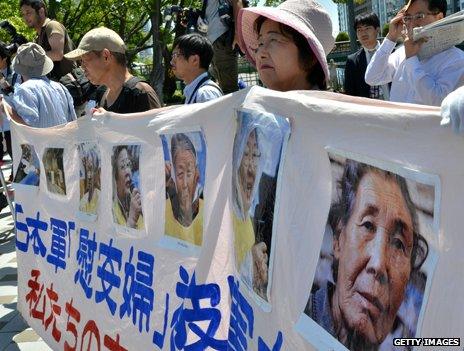
The comments sparked protests in South Korea and in Japan
To raise awareness and debate about the issue, the House of Sharing has built a historical museum at the site, housing official documents, old photographs and testimony from several survivors. There are vivid paintings, too - part of the therapy offered to residents.
The museum draws a small stream of visitors from around the world - including, on the day we visited, a group of American university students on a study tour of South Korea. Most, like history major Christopher DeWald, had never heard about Japan's wartime use of comfort women.
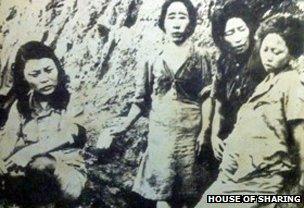
The brothels were termed "comfort stations"
"I was a history major for three years in college, and it makes me wonder why we don't learn more about it in America," he says. "Especially with the conflict between North and South Korea, and the Korean War, where America helped out South Korea. I think it would be very beneficial for America to say, 'Look, Japan, you've got to do something about this.' It's something that's very close to us because we're very close with South Korea."
Some US politicians have taken up the issue in recent years, but the home's general manager, Ahn Shin Kweon, says that international awareness still lags behind that of other major human rights abuses.
"In the US a lot is known about the Holocaust, for example," he says. "There are lots of museums and facilities to raise awareness. In contrast, the issue of comfort women is much less known. Partly, that's because Korea has had a late start - we've been so caught up in our own industrialisation, and we only have a limited number of scholars or academic papers on this issue. Also, a lot of the official documents are stored in Japan, with restricted access. We only have the oral testimonies of the women themselves. That's why we decided to build the museum."
These days, 40% of the visitors are Japanese, who come to find out about their country's past. For the moment, part of that history is still living, in the house behind the museum. Some of the women occasionally meet the museum's Japanese visitors - by prior arrangement - to try to get some kind of acknowledgement and to raise awareness.
But in perhaps just a few more years, this small collection of photos, belongings and mournful statues may be all that's left.
You can follow the Magazine on Twitter, external and on Facebook, external